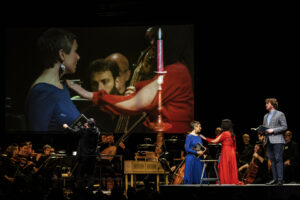Productions of Handel’s 1707 oratorio “Il Trionfo del Tempo e del Disinganno” in its first version (HWV 46a) are by no means rare. A conversational piece with plenty of contrasting moods and emotional tension but little in the way of physical action, it is often presented as a concert performance, although successful staged productions are not unusual. Göttingen’s International Handel Festival opted for a concert performance; however, such was the quality of Ilka Seifert ‘s direction and Folkert Uhde ‘s staging that even without scenery or costumes, it successfully captured many of the qualities of a fully staged performance.
The work is an allegory centered on Bellezza (Beauty), who is encouraged by Piacere (Pleasure) to follow a life of thoughtless diversion, while Tempo (Time) and Disinganno (Enlightenment) warn her to abandon such a frivolous path in favor of truth and so gain a place in heaven! It is a work with a message that reflects and promotes the librettist Cardinal Pamphilj’s own religious philosophy, in which he appears to reject the idea of virtuous pleasure. The initial impression of seeing the jumbled stage at Göttingen’s Stadthalle left one feeling a little confused. Everything appeared to be awkwardly arranged, certainly not as one would expect for a standard concert.

The orchestra was situated slightly to the left, with a raised area to the right, on which was positioned a large mirror along with a chair. From the left-hand side, at the .
















